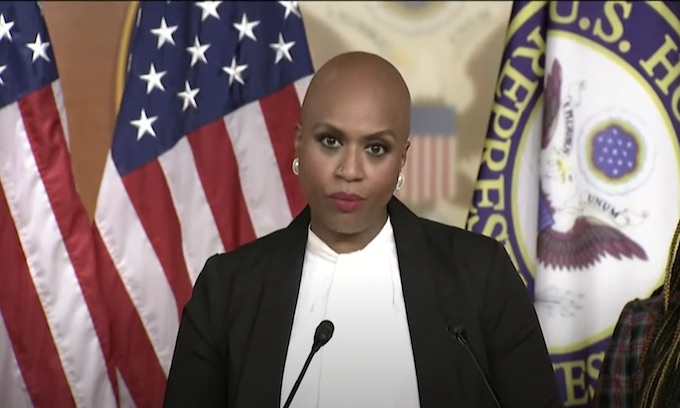After 100 years of campaigning, the Equal Rights Amendment (ERA) is getting another push to pass it through Congress.
In a joint resolution on Tuesday, Senate and House Democrats announced their commitment to passing the Equal Rights Amendment.
The amendment would give states and Congress power to ensure that, “Equality of rights under the law shall not be denied or abridged by the United States or by any State on account of sex.”
“I am truly overjoyed to stand shoulder to shoulder with these women who know how to get things done and some good men as well as we introduce transformative legislation to move us closer to finally codifying gender equality in the United States Constitution,” said Congresswoman Ayanna Pressley (D-Mass.).
Pressley is a member of “The Squad,” a group of left-wing progressive Congress members.
The ERA has a complex history. The most recent attempt started in 1972 when Congress offered the amendment to the states.
But the amendment had a deadline in 1982. If the ERA missed this deadline, the states would have to try the whole amendment process again, according to the Congressional Research Service (CRS).
“The second proposed amendment to have failed of ratification is the Equal Rights Amendment, which formally died on June 30, 1982,” a CRS paper reads.
But after the deadline, states ratified the amendment.
Now, Reps. Pressley, Madeleine Dean (D-Pa.), Cori Bush (D-Mo.), Sylvia Garcia (D-Texas), Abigail Spanberger (D-Va.), Sydney Kamlager-Dove (D-Ca.), and Sens. Dick Durbin (D-Ill.), Mazie Hirono (D-Hawaii), and Ben Cardin (D-Md.) argue the deadline didn’t mean anything because it was “arbitrary.”
According to Sen. Ben Cardin (D.-Md.), the 27th Amendment passed about 200 years after its proposal.
“The Constitution imposes no time limit on the ratification of amendments. The 27th Amendment, the last to be approved, was debated for two centuries,” he said.
Durbin’s office told the Epoch Times he wanted Republicans to join in the push to pass the amendment.
“It is long past time to explicitly prohibit discrimination based on sex in our Constitution. It would send an important and overdue message to women and girls that they are equal under the law,” Durbin said. “Let’s come together on a bipartisan basis, repeal this deadline, and finally make the Equal Rights Amendment the law of the land by passing this joint resolution.”
According to research by the Heritage Foundation, judicial interpretations of the 14th Amendment effectively offer women the same protections the ERA would offer: “No State shall make or enforce any law which shall abridge the privileges or immunities of citizens of the United States; nor shall any State deprive any person of life, liberty, or property, without due process of law; nor deny to any person within its jurisdiction the equal protection of the laws.”
“Legislatures and courts were fulfilling the ERA’s promise without the ERA,” a Heritage report reads.
Politicians spangled the meeting for the resolution with buzzwords like “equity,” “inclusion,” “minority,” and “queer.”
The representatives said the ERA would help with issues including women earning less than men, discrimination against women, sexism, pregnancy-related discrimination, access to abortion, sexual assault, and murder of minority women.
“Each week that goes by without the ERA is a week where we allow—we, Congress—we allow injustice and inequity to thrive and to continue to impact and harm women and communities across this country.”
Hawaii’s Sen. Hirono said the ERA might have prevented the end of Roe v. Wade.
“I agree with the scholars who say that if the ERA had been in effect, perhaps the Supreme Court would have had to pause before doing away with protections under Roe because they would be discriminating against pretty much a gender-specific medical procedure that impacts one gender,” she said.
Pressley added that the amendment would somehow improve “protection for LGBTQ folks.” However, she didn’t say precisely what form this improvement might take.
“Our resolution will address centuries of gender discrimination in America by removing the unnecessary barriers that have prevented us from enshrining the dignity, the humanity, and equality of women into our United States Constitution,” Pressley stated.



















“The amendment would give states and Congress power to ensure that, “Equality of rights under the law shall not be denied or abridged by the United States or by any State on account of sex.””
#1. Sex must be completely defined as also gender needs to be completely defined.
Democrats see everything as subjective, how they feel things should be (not as they are) their whole world is subjective. Not Objective.
To the Democrat Party cult and their disciples, Sex, Gender, Truth, Facts, Reality and History are all irrelevant, if the Democrats do not WANT to believe them or they disagree with them. Democrats will just make up their own, Sex, Gender, Truth, Facts, Reality and History to fit what they WANT to believe or fits into the Con or Deception that they are running at the time.
AND WHAT rights, are NOT BEING given to everyone? Voting? HELL many areas give that to ILLEGALS..
Rent? Don’t see minorities discriminated against..
So what is it?
So why wait until the Democrats lose control of the House to push this next doomed-to-fail attempt at legislating morality, that only ends up in immoral discrimination against the American successful of all colors who take on more national debt due to our best and brightest innovators being handcuffed into forced equity outcomes that prevent making America Great again, beginning with equal opportunity of excelling at the individual level that results in the collective success of a nation? The liberals whose arguments are as bald as their heads, have no real interest in equality, just race and gendered privileged opportunity to get social advantages they never could earn in fair competition, so they rig the system in forced equal outcomes which degrade and depress in guilt and unfair rules, the truly excellent who should be becoming our leaders in accomplishment, not by buying votes with deceptive laws that takes from the excellent and gives to the failing and unworthy, many who now in squads of Congressional deceptions, who just breed more hate, envy and division, now at a national level, whose programs never fly or get off the ground when they clip their own wings in vapid stupidity.
Like always, its so they can LOOK like they are trying to do something.
With all the diversity and fluidity of the mind concerning sex, gender and now the transitioning, when Supreme Court nominees cannot or will not answer what a woman is, this is a bad idea. The left wants it both ways, first it was equal rights for woman while at the same time they have destroyed the distinction between the sexes!
I didn’t realize the Bill of Rights played favorites.
No, but the left LOVES TO!
I can agree if ?? right to life.?? I guess that means no abortions?? Privileges and immunities clause ,which mean you have to be born or naturalized to be a citizen of the U.S. Or a state.
We don’t have enough in place to already provide these protections?